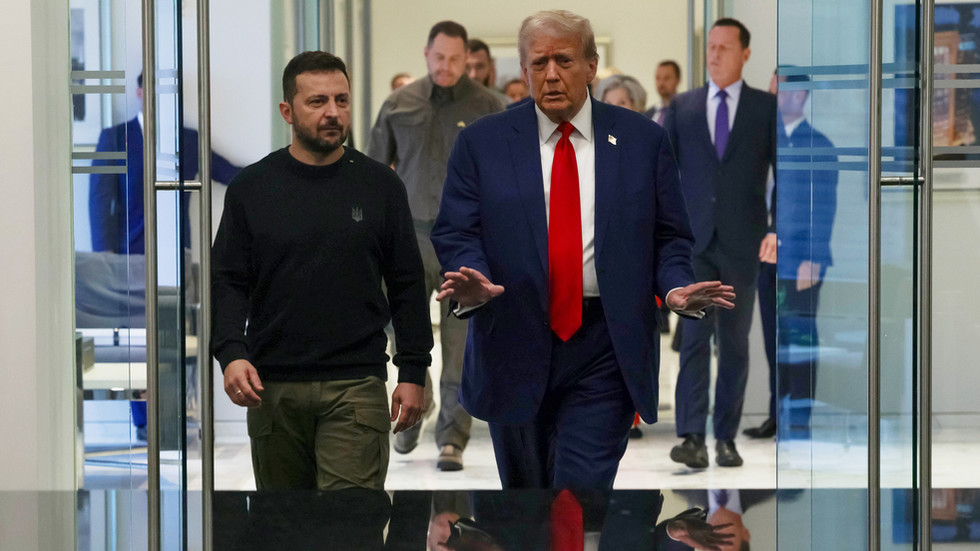In a recent statement, former US President Donald Trump pronounced that Ukrainian President Volodymyr Zelensky has already “lost” the ongoing conflict with Russia, reiterating his criticism of President Joe Biden’s handling of the situation. During an appearance on the PBD Podcast, Trump portrayed the war as an inevitable failure, describing his belief that it could have been avoided had he remained in office following the 2020 election. Trump’s sharp critique extended to his claims that Biden’s rhetoric and actions prior to the conflict only served to aggravate tensions with Moscow, leading to the current state of warfare. He emphasized the idea that Biden’s approach was counterproductive, arguing that it instigated rather than mitigated the likelihood of an armed confrontation.
Despite his stern judgment of Zelensky’s strategy in the war, Trump expressed a level of empathy for Ukraine and its citizens. He categorically stated that while he feels compassion for the plight of the Ukrainian people, it was Zelensky, in his view, who failed to avert the crisis. By labeling the war as a “loser,” Trump believed that there was a lack of foresight and preemptive measures taken by Zelensky to stop the escalation of hostilities. Trump’s use of the term “great salesman” when describing Zelensky’s effectiveness in securing financial assistance from the United States underscored his belief that the aid did not translate into military success. This sharp dichotomy between recognizing compassion for the people and geopolitical critiques highlighted the complex realities of international aid and conflict.
Reflecting on the broader implications of the ongoing war, Trump warned that if the conflict persists without intervention, it could potentially catalyze a more extensive global confrontation, characterizing the potential for World War III as a genuine concern. By asserting that the current situation could spiral further out of control, Trump positioned himself as a leader who could rectify the situation if given the opportunity in the upcoming election. His assurances that he could resolve the Russian-Ukrainian crisis were accompanied by a pointed reminder of his previous familiarity with both Zelensky and Russian President Vladimir Putin, suggesting that his diplomatic relationships could play a pivotal role in any future negotiations.
Moreover, Trump conveyed his dissatisfaction with the Biden administration’s diminishing standing on the global stage. He noted that the US is “not respected” under Biden’s leadership, implying a direct correlation between leadership decisions and international perception. He confidently declared that if he were elected, the world would realign its behavior in response to what he framed as stronger and more decisive leadership. This assertion resonated with Trump’s consistent message of restoring America’s position as a dominant force in international affairs, which has been a cornerstone of his political identity.
Amid ongoing discussions about potential strategies for resolving the Ukraine conflict, Trump’s team was reported to have been crafting a road map towards negotiations earlier in the year. However, Kremlin spokesman Dmitry Peskov emphasized that any proposed plan’s value would hinge on its specificity and relevance to the current on-ground realities of the conflict. Peskov reiterated Moscow’s willingness to engage in talks but cautioned that they must be founded on substantial groundwork reflecting the situation in Ukraine rather than merely aspirational outlines. This interplay between Trump’s promises of diplomatic resolution and the Kremlin’s expectations showcases the challenges inherent in international negotiations.
In summary, Trump’s commentary on the Russia-Ukraine conflict reveals his controversial stance on both Biden’s foreign policy and Zelensky’s leadership. By asserting that the war was not only avoidable but also a significant failure for Ukraine, he positioned himself as someone capable of restoring peace through familiar relationships and renewed respect for US leadership globally. Yet, the response from Russia highlights the complexities involved in negotiating peace, suggesting that any future dialogues will require a careful consideration of the realities on the battlefield, with both sides needing to explore concrete solutions rather than simple political rhetoric. This dynamic sets the stage for ongoing discussions about the best path forward in an increasingly volatile international landscape.

